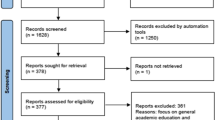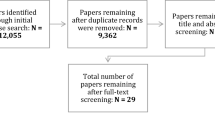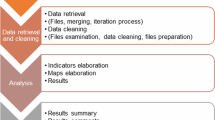Abstract
Innovative instructional technologies, especially virtual reality devices, are becoming more prominent and feasible in science education. Concerning science laboratories, activities enriched with virtual reality technology have the potential to make unobservable phenomena accessible in any school. This virtual reality technology has the potential to lead in a new milestone in terms of acquisition of the science process skills, not only in secondary school students but also in the training of pre-service science teachers. This mixed-method study aimed to investigate the effect of virtual reality enriched laboratory activities’ effects on the science process skills of pre-service science teachers in Turkey. The pretest-posttest control group quasi-experimental intervention was conducted with 54 3rd-grade pre-service science teachers enrolled in a state university in the Eastern Anatolia region of Turkey. There were 24 participants in the experimental and 30 participants in the control group. The science process skills test was administered to both groups before and after the six-week-long intervention. Also, semi-structured interviews were conducted with six participants from the experimental group after the intervention process. Even though the groups did not differ at the end of the intervention, the increase of the scores in the experimental group was found to be statistically significant, concerning the overall test scores and the sub-dimension of Experimenting. Furthermore, qualitative findings signify a prominent emphasis on Observing. The potential causations and derived implications are discussed.





Similar content being viewed by others
References
Akçayır, M., Akçayır, G., Pektaş, H. M., & Ocak, M. A. (2016). Augmented reality in science laboratories: The effects of augmented reality on university students’ laboratory skills and attitudes toward science laboratories. Computers in Human Behavior, 57, 334–342. https://doi.org/10.1016/j.chb.2015.12.054.
Bakırcı, H., Artun, H., & Durukan, A. (2017) What does the concept of virtual reality mean for preservice science teachers? In 26th International Conference on Educational Sciences, Antalya, (pp. 1731–1734): Pegem.
Brinson, J. R. (2015). Learning outcome achievement in non-traditional (virtual and remote) versus traditional (hands-on) laboratories: A review of the empirical research. Computers & Education, 87, 218–237. https://doi.org/10.1016/j.compedu.2015.07.003.
Büyüköztürk, Ş. (2018). Sosyal Bilimler için Veri Analizi El Kitabı İstatistik, Araştırma Deseni SPSS Uygulamaları ve Yorum (Vol. 24). Ankara: Pegem Akademi Yayıncılık.
Büyüköztürk, Ş., Akgün, Ö. E., Karadeniz, Ş., Demirel, F., & Kılıç-Çakmak, E. (2018). Bilimsel Araştırma Yöntemleri (Vol. 24). Ankara: Pegem Akademi Yayıncılık.
Çalışkan, E. (2017). Eğitimde yenilikçi teknolojilerin kullanımı açısından Türkiye’de son beş yıl içerisinde (2011-2015) tamamlanmış lisansüstü tezlerin incelenmesi. Journal of Human Sciences, 14(1), 496-505, doi:https://doi.org/10.14687/jhs.v14i1.4169.
Camnalbur, M., & Erdoğan, Y. (2008). Bilgisayar destekli öğretimin etkililiği üzerine bir meta analiz çalışması: Türkiye örneği. Kuram ve Uygulamada Eğitim Bilimleri, 8(2), 481–505.
Çepni, S. (2014). Araştırma ve Proje Çalışmalarına Giriş (Vol. 7). Trabzon: Celepler Matbaacılık.
Chittaro, L., & Ranon, R. (2007). Web3D technologies in learning, education and training: Motivations, issues, opportunities. Computers & Education, 49(1), 3–18. https://doi.org/10.1016/j.compedu.2005.06.002.
Cramer, D. (2003). Advanced quantitative data analysis (Vol. 1): Open University press.
Creswell, J. W. (2014). A concise introduction to mixed methods research (1ed., Vol. 1, Sage Mixed Methods Research). USA: SAGE Publications.
Creswell, J. W., & Clark, V. P. (2014). Designing and Conducting Mixed Methods Research (Y. Dede, & a. Demir, trans., Vol. 2). Ankara: Anı Yayıncılık.
Daşdemir, İ., Uzoğlu, M., & Cengiz, E. (2012). 7. sınıf vücudumuzdaki sistemler ünitesinde animasyon kullanımının öğrencilerin akademik başarılarına, öğrenilen bilgilerin kalıcılığına ve bilimsel süreç becerilerine etkisi. Trakya Üniversitesi Eğitim Fakültesi Dergisi, 2(2), 54–62.
Durukan, A. (2019). Gerçekliğin Ötesinde Eğitim: Sanal Gerçeklik Destekli Fen Öğretimi. In S. Aydın-Günbatar & H. Artun (Eds.), Çağdaş Yaklaşımlarla Destekli Fen Öğretimi: Teoriden Uygulamaya Etkinlik Örnekleri (Vol. 1, pp. 233–252). Ankara: Pegem Akademi Yayıncılık.
Durukan, A., Temur, A., Artun, H., Tuysuz, M., & Sardag, M. (2018) Reflections from the virtual reality assisted laboratory applications in the education of pre-service science teachers. In 27th International Conference on Educational Sciences, Antalya, Turkey, April 18–22 2018 (Vol. 1, pp. 1855–1860). Ankara, Turkey: Pegem Akademi. doi:https://doi.org/10.14527/978-605-241-229-9.
Funk, H. J. (1985). Learning Science Process Skills (2ed.): Kendall/hunt publishing company.
Google (2017). Google Cardboard - Google VR. https://vr.google.com/cardboard/. Accessed 28 Ağustos 2018.
Hernández-de-Menéndez, M., Vallejo Guevara, A., & Morales-Menendez, R. (2019). Virtual reality laboratories: A review of experiences. International Journal on Interactive Design and Manufacturing (IJIDeM), 13(3), 947–966. https://doi.org/10.1007/s12008-019-00558-7.
Jensen, L., & Konradsen, F. (2017). A review of the use of virtual reality head-mounted displays in education and training. [journal article]. Education and Information Technologies, 23(4), 1515–1529. https://doi.org/10.1007/s10639-017-9676-0.
Kapici, H. O., Koca, E. E., & Akcay, H. (2018) Effects of writing to learn activities in hands-on and virtual laboratory environments. In The Eurasia Proceedings of Educational and Social Sciences, (Vol. 9, pp. 48–51): ISRES Publishing.
Karasar, N. (2016). Bilimsel Araştırma Yöntemi (Vol. 31). Ankara: Nobel Yayın Dağıtım.
Karsli, B. F., Ayas, A., & Cali̇k, M. (2019). Effects of 5Es learning model on pre-service science teachers’ conceptual understanding and science process skills: A case of gases and gas laws. Journal of the Serbian Chemical Society, 84(0), 1–15, doi:https://doi.org/10.2298/JSC190329123D.
Kitjinda-Opas, N., Suksringarm, P., & Singseewo, A. (2009). Effects of environmental education learning by using the 7Es-learning cycle with multiple intelligences and the teacher’s handbook approaches on learning achievement, critical thinking and integrated science process skills of high school (grade 10) students. Pakistan Journal of Social Sciences, 6(5), 292–296.
Lamb, R., Antonenko, P., Etopio, E., & Seccia, A. (2018). Comparison of virtual reality and hands on activities in science education via functional near infrared spectroscopy. Computers & Education, 124, 14–26. https://doi.org/10.1016/j.compedu.2018.05.014.
Lavoie, D. R. (1999). Effects of emphasizing hypothetico-predictive reasoning within the science learning cycle on high school student's process skills and conceptual understandings in biology. Journal of Research In Science Teaching, 36(10), 1127-1147, https://doi.org/10.1002/(Sici)1098-2736(199912)36:10<1127::Aid-Tea5>3.0.Co;2-4.
Lee, E. A.-L., & Wong, K. W. (2008). A Review of Using Virtual Reality for Learning. In Z. Pan, A. D. Cheok, W. Müller, & A. El Rhalibi (Eds.), Transactions on Edutainment I (pp. 231–241, Lecture Notes in Computer Science). Berlin, Heidelberg: Springer Berlin Heidelberg.
Lee, E. A.-L., Wong, K. W., & Fung, C. C. (2010). How does desktop virtual reality enhance learning outcomes? A structural equation modeling approach. Computers & Education, 55(4), 1424–1442. https://doi.org/10.1016/j.compedu.2010.06.006.
Liou, H.-H., Yang, S. J. H., Chen, S. F., & Tarng, W. (2017). The influences of the 2D image-based augmented reality and virtual reality on student learning. Educational Technology & Society, 20(3), 110–121.
Makransky, G., Mayer, R. E., Veitch, N., Hood, M., Christensen, K. B., & Gadegaard, H. (2019a). Equivalence of using a desktop virtual reality science simulation at home and in class. PLoS One, 14(4), e0214944. https://doi.org/10.1371/journal.pone.0214944.
Makransky, G., Terkildsen, T. S., & Mayer, R. E. (2019b). Adding immersive virtual reality to a science lab simulation causes more presence but less learning. Learning and Instruction, 60, 225–236. https://doi.org/10.1016/j.learninstruc.2017.12.007.
McCusker, J. R., Almaghrabi, M., & Kucharski, B. (2018). Is a virtual reality-based laboratory experience a viable alternative to the real thing? Paper presented at the 2018 ASEE Annual Conference & Exposition, Salt Lake City, UT, June 24–27.
MoNE. (2013). Fen Bilimleri Dersi Öğretim Programı. Ankara: Talim ve Terbiye Kurulu Başkanlığı.
MoNE. (2017). Fen Bilimleri Dersi Taslak Öğretim Programı. Ankara: Talim ve Terbiye Kurulu Başkanlığı.
MoNE. (2018). Fen Bilimleri Dersi Öğretim Programı. Ankara: Talim ve Terbiye Kurulu Başkanlığı.
Musawi, A. A., Ambusaidi, A., Balushi, S. A., & Balushi, K. A. (2018). The impact of using virtual lab learning experiences on 9th grade students’ achievement and their attitudes towards science and learning by virtual lab. Journal of Turkish science education, 15(2), 13-29, doi:https://doi.org/10.12973/tused.10227a.
Mutlu, A., & Şeşen, B. A. (2016). Impact of virtual chemistry laboratory instruction on pre-service science teachers’ scientific process skills. Paper presented at the ERPA international congresses on education 2015 (ERPA 2015),
NARST (2018). The Science Process Skills | Narst. https://narst.org/research-matters/science-process-skills. .
NSTA. (2012). NSTA preservice science standards. VA: Arlington.
Padilla, M. J. (1986). The science process skills. Research matters...to the science teacher [microform] / Michael J. Padilla (Vol. Accessed from https://nla.gov.au/nla.cat-vn5463470). [Washington, D.C.]: Distributed by ERIC Clearinghouse.
Padilla, M. J. (1990). The science process skills. https://www.narst.org/publications/research/skill.cfm. Accessed 05/07/2019 9004.
Padilla, M. J., & NSTA (1986). The science process skills (Research Matters...To the Science Teacher, Vol. https://nla.gov.au/nla.cat-vn5463470). Washington, D.C.: ERIC Clearinghouse.
Pan, Z. G., Cheok, A. D., Yang, H. W., Zhu, J. J., & Shi, J. Y. (2006). Virtual reality and mixed reality for virtual learning environments. Computers & Graphics, 30(1), 20–28. https://doi.org/10.1016/j.cag.2005.10.004.
Paxinou, E., Karatrantou, A., Kalles, D., Panagiotakopoulos, C., & Sgourou, A. (2018). A 3D virtual reality laboratory as a supplementary educational preparation tool for a biology course. European Journal of Open, Distance and E-learning, 21(2).
Schuemie, M. J., van der Straaten, P., Krijn, M., & van der Mast, C. A. (2001). Research on presence in virtual reality: A survey. Cyberpsychology & Behavior, 4(2), 183–201. https://doi.org/10.1089/109493101300117884.
Silay, I., & Çelik, P. (2013). Evaluation of scientific process skills of teacher candidates. Procedia - Social and Behavioral Sciences, 106, 1122–1130. https://doi.org/10.1016/j.sbspro.2013.12.126.
Siswanto, S., Gumilar, S., Yusiran, Y., & Trisnowati, E. (2018). Scientific approach-integrated virtual simulation: A physics learning design to enhance student's science process skills (SPS). Unnes Science Education Journal, 7(1), 7–12. https://doi.org/10.15294/usej.v7i1.21359.
Smetana, L. K., & Bell, R. L. (2012). Computer simulations to support science instruction and learning: A critical review of the literature. International Journal of Science Education, 34(9), 1337–1370. https://doi.org/10.1080/09500693.2011.605182.
Triatmaja, A. K., & Khairudin, M. (2018). Study on skill improvement of digital electronics using virtual laboratory with mobile virtual reality. Journal of Physics: Conference Series, 1140, 012021. https://doi.org/10.1088/1742-6596/1140/1/012021.
Trindade, J., Fiolhais, C., & Almeida, L. (2002). Science learning in virtual environments: A descriptive study. British Journal of Educational Technology, 33(4), 471–488. https://doi.org/10.1111/1467-8535.00283.
van Dam, A., Laidlaw, D. H., & Simpson, R. M. (2002). Experiments in immersive virtual reality for scientific visualization. Computers & Graphics, 26(4), 535–555. https://doi.org/10.1016/s0097-8493(02)00113-9.
Weber, R. (1990). Basic content analysis (2ed., Vol. 49, Quantitative Applications in the Social Sciences). Thousand Oaks: Sage.
Yang, K.-Y., & Heh, J.-S. (2007). The impact of internet virtual physics laboratory instruction on the achievement in physics, science process skills and computer attitudes of 10th-grade students. [journal article]. Journal of Science Education and Technology, 16(5), 451–461. https://doi.org/10.1007/s10956-007-9062-6.
Yıldırım, M. (2011). Bilimsel süreç becerileri arasındaki ilişki [interrelationships of scientific process skills]. Unpublished master’s thesis, Atatürk University, Erzurum, Turkey.
Author information
Authors and Affiliations
Corresponding author
Additional information
Publisher’s note
Springer Nature remains neutral with regard to jurisdictional claims in published maps and institutional affiliations.
Rights and permissions
About this article
Cite this article
Artun, H., Durukan, A. & Temur, A. Effects of virtual reality enriched science laboratory activities on pre-service science teachers’ science process skills. Educ Inf Technol 25, 5477–5498 (2020). https://doi.org/10.1007/s10639-020-10220-5
Received:
Accepted:
Published:
Issue Date:
DOI: https://doi.org/10.1007/s10639-020-10220-5




